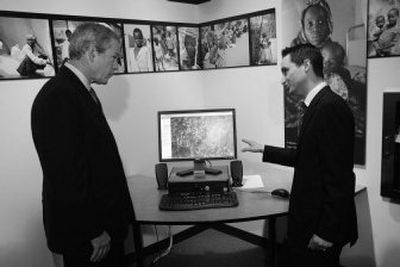Bush puts pressure on Sudan

WASHINGTON – President Bush said Wednesday that if U.N. efforts to bring peace to Darfur do not soon bear fruit, the United States would increase and tighten economic sanctions intended to end what he described as the genocide taking place there.
In his most extensive remarks on the crisis, Bush threatened new economic restrictions on Sudan and those doing business there. He also raised the possibility of seeking international steps to block the Sudanese government from flying military aircraft in the region.
“It is evil we’re now seeing in Sudan, and we’re not going to back down,” Bush said.
The president spoke at the U.S. Holocaust Memorial Museum near the White House, associating the horrors inflicted by the Nazis to the campaign against the people of Darfur in western Sudan. The Sudanese government has been accused of fighting a rebellion by arming Arab militias, known as janjaweed, to attack civilian populations and rival non-Arab tribes.
The president said that if Sudan’s president, Omar Hassan Ahmed Bashir, did not quickly follow through on his promise to allow the United Nations to send attack helicopters and 3,000 international peacekeepers to Darfur, his administration would launch a new campaign to end the violence.
Lawrence G. Rossin, the senior international coordinator for the Save Darfur Coalition, an alliance of more than 180 organizations seeking to raise public awareness of conditions in Darfur, praised Bush for setting “a fairly high bar” for Bashir to meet.
But Rossin, a former senior United Nations and State Department official, said Bush would have been justified in imposing sanctions now, without waiting.
A White House official, speaking on the condition of anonymity because he was discussing diplomatic negotiations, said Bush was prepared to announce specific sanctions Wednesday but yielded to a request from U.N. Secretary-General Ban Ki-moon to wait to see whether the Sudanese government honors its pledge to give U.N. units a greater role.
Outlining sanctions he would impose, Bush said the Treasury Department would block commercial Sudanese transactions within the U.S. financial system and would bar 29 companies with ties to the Sudanese government from doing business within the U.S. system.
He also would make it a crime for American companies to do business with those companies.
The conflict in Darfur has taken more than 200,000 lives, Bush said, and displaced more than 2 million people, forcing them into refugee camps.
New questions about the role of the Sudanese government were raised by a confidential U.N. panel that reported that Sudan’s government is flying arms into Darfur in planes painted to resemble U.N. aircraft, adding momentum to the push for sanctions.
The findings of the report, first reported Tuesday on the New York Times’ Web site, said the planes were being used for aerial surveillance and bombing villages, in addition to transporting weapons and cargo.